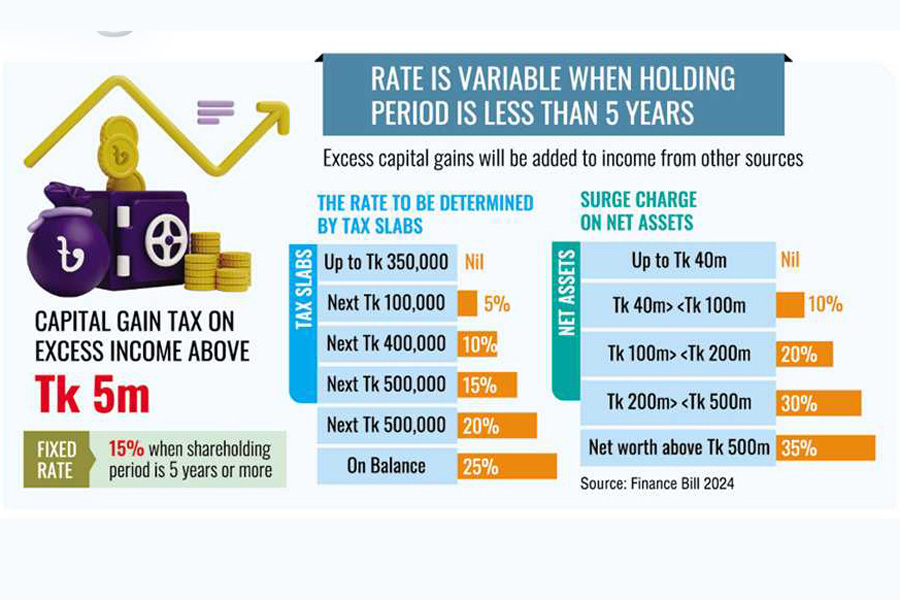
Published :
Updated :

Capital gain tax on individual investors that the parliament passed for FY25 will help streamline the equity market by encouraging long-term investments and deterring stock manipulations to some extent, experts say.
The fear that the bearish market will be rattled by the first-time imposition of the tax does not seem to have any ground. The number of investors having large equity investments, which will fetch capital gains exceeding Tk 5 million, when the tax will be applicable, is insignificant.
"The impact of the capital gain tax on the overall market is insignificant," said Md Sajedul Islam, managing director of Shyamol Equity Management. More than 90 per cent investors -- institutional investors and sponsor-directors -- have already been paying gain tax, while the number of high net-worth individuals in the stock market is less than 5 per cent, he added.
Enterprises and sponsor-directors are required to pay capital gain tax at a rate of 15 per cent and 10 per cent respectively, which remain unchanged for FY25.
The number of beneficiary owner's (BO) accounts with investments worth Tk 10 million is around 10k, including that of companies and sponsor-directors, as of March this year, while the total number of BO accounts is 1.78 million, according to the Central Depository Bangladesh that preserves electronic data of all individual and institutional investors.
The government passed the Finance Bill 2024 on Saturday, going ahead with a 15 per cent capital gain tax on individual investors, imposed on the excess gains after earnings of Tk 5 million from share trading. Profits up to Tk 5 million from share transactions will be exempted from the tax measure.
If anyone secures such a big amount of capital gains, they should pay tax, said Mr Islam.
The tax rate will vary depending on the shareholding duration. The rate is set at 15 per cent if an investor has held onto the shares for five years or more before selling them. If the time is less than five years, capital gains will be added to the taxpayer's income from other sources before the rate is determined by the tax slabs fixed for individual taxpayers.
The individual-level tax rate will go up to 33.75 per cent for FY25 if his/her net worth surpasses Tk 500 million, with the maximum tax rate on income kept unchanged at 25 per cent for what the government said is to ease the tax burden on taxpayers.
Economists and market experts think the time condition attached to the gain tax will prompt high net-worth individuals to keep holdings for a long term.
"Large investors will consider keeping holdings for longer durations to generate dividend income," said M A Baqui Khalily, former chairman of the finance department of the University of Dhaka.
Chasing short-term profits has been a popular practice in the stock market in Bangladesh. In doing so, investors more often than not bet on junk stocks instead of investing in fundamentally-strong stocks. With large amounts of cash in hand, it is easy for big investors to secure abnormally high profits from trading in manipulative stocks.
After the imposition of the gain tax, beneficial owners' (BO) accounts of high net-worth individuals will come under scrutiny of the revenue authority for the first time.
That is likely to serve as a deterrent to stock price manipulation, said Prof Khalily, who served as director of the Dhaka Stock Exchange for a decade.
Since individual individuals have never been subject to capital gain tax until now, it will elicit some psychological reactions initially but that will eventually peter out.
On Sunday, the market lost 65 points within the first 10 minutes after the trading began but recovered most of the losses by the time it drew to a close. The index finally edged down 27 points to 5,328, with turnover hitting a 6-week high of Tk 7.12 billion.
Market insiders say the gain tax would not have much influence on the market.
However, if the matter is seen in terms of equality, the move is the right way forward.
The capital gain tax falls under the category of direct tax, generally progressive in principle, as the tax is collected on income. On the other hand, indirect taxes such as value-added tax (VAT) or supplementary duties tend to be regressive.
Although the tax rates under the indirect taxation system are the same for the rich and the poor, the amount paid by the poor is higher in proportion to their income.
"The imposition of capital gain tax on big investors will lead to a reduction in inequality to some extent when it comes to paying taxes," said Prof Khalily.
babulfexpress@gmail.com


 For all latest news, follow The Financial Express Google News channel.
For all latest news, follow The Financial Express Google News channel.